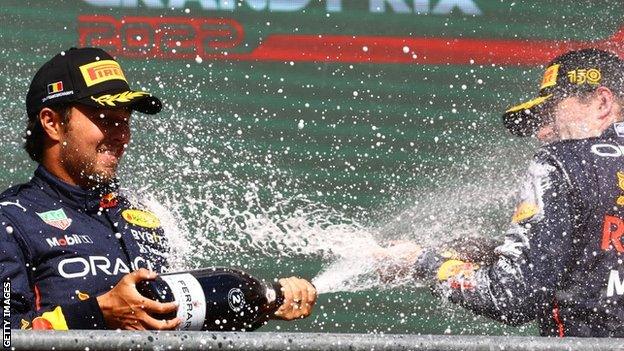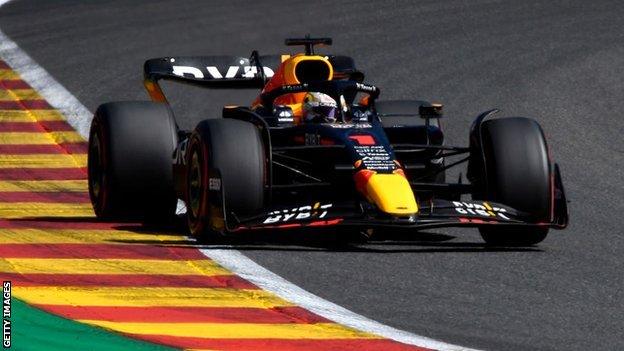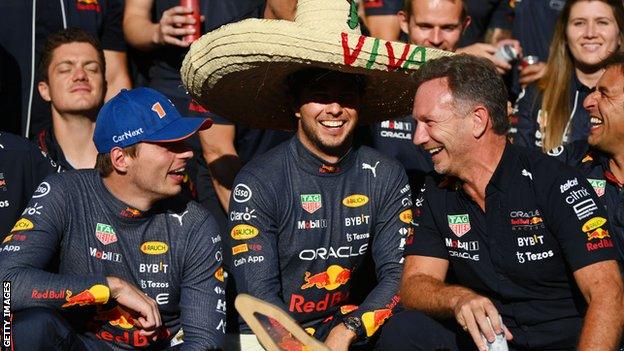Belgian Grand Prix: No stopping 'phenomenal' Max Verstappen as second title approaches
- Published

This is Red Bull's fourth one-two this season
There is just no stopping Max Verstappen right now - not on his way to a stunning victory in the Belgian Grand Prix, and not as he heads inexorably towards a second consecutive world championship.
The Red Bull driver's first title may have been won in dramatic and controversial circumstances in Abu Dhabi last year, but the only remaining question marks over his second are when he will clinch it.
Mercedes team principal Toto Wolff said after Sunday's race at Spa-Francorchamps that it would be by the time Formula 1 leaves Europe.
As that is in two races' time and there will still be six races to go at that point, that is highly unlikely. But shortly after that, in either Singapore or Japan, now looks distinctly possible.
When it comes, he will deserve it. His driving this season has been peerless, and in Spa that was more the case than ever.
On pole by more than 0.6 seconds; consistently quicker than anyone else in the race by at least a second. He was, as his Red Bull team-mate Sergio Perez put it, "on another level".
The Red Bull team principal Christian Horner described it as "a phenomenal performance".
"Max was quite simply in a league of his own," Horner said. "And not just today; all weekend. He has excelled here in the past and today he has basically smashed it out of the park."
Horner added: "Max, since winning that championship last year, has taken another step. It's in many ways released him, and he's driving at an incredible level.
"A driver that is completely at one with the car and is in an absolute purple patch of his career."
Records under threat
It was Verstappen's ninth win in 14 races, and right now it is difficult to see how anyone else will win another race this season.
They probably will, of course. Red Bull surely can't be as dominant as this at all the remaining eight races. Or perhaps they can.
Certainly, the single-season record of 13 wins, held jointly by Michael Schumacher with Ferrari in 2004 and Verstappen's predecessor at Red Bull, Sebastian Vettel, in 2013, is looking vulnerable.
Indeed, Horner described this as "probably one of the most dominant performances that we have had as a team since either 2010 [he meant 2011] or 2013. It is right up with that period, and I don't think we have ever won a race starting from 14th on the grid."
In 2013, it is worth reminding oneself, Vettel won the final nine races in a row. Verstappen is already on a run of three, and he heads into his home race in Zandvoort this coming weekend, a race he utterly dominated last year in his close championship battle with Lewis Hamilton.
'The car has been incredible'
Verstappen acknowledged that this was, in terms of an entire grand prix weekend, the most dominant performance of his career. Not even a penalty for using too many engine parts, that led him to start the race in 14th on the grid, delayed him too much at Spa.
By lap 12, he was in the lead for the first time after Ferrari's Carlos Sainz made his first pit stop from the lead; seven laps later, after his own first pit stop, Verstappen had it for real. And that was the last time anyone saw him.
"The car has been incredible from first practice," Verstappen said. "We didn't expect it to be like this but it is nice when things positively surprise you and it has been really enjoyable to drive it around here.
"We had difficulties starting 14th which wasn't easy, it was very hectic in front of me but once everything calmed down literally overtaking one car every lap and when I saw the softs were holding on I knew there was a good possibility we could win the race."
Horner said that "to be fighting for the lead by lap 18 was beyond any of our predictions; when you look at pre-race plots, it looked like by the last pit stop we could be somewhere around the podium."
Others had already seen the writing on the wall. Mercedes' George Russell said after qualifying he expected Verstappen to win. And up and down the paddock on Sunday many more agreed.
How good were Verstappen and Red Bull at Spa. A little vignette in the last part of the race proved it.
He set fastest lap - on medium tyres, on his first lap of his final stint, still with 13 laps of fuel left in the car. Ferrari's Charles Leclerc made a late pit stop to try to grab it back, in a vain attempt to limit the championship damage.
It went wrong, as so many things have for Ferrari this year.
Leclerc broke the pit-lane speed limit because Ferrari's back-up system after an early failure was wrongly calibrated. He was passed for fifth place by Fernando Alonso's Alpine as he rejoined the track. And could not get within 0.6secs of Verstappen's time, despite an empty tank, soft tyres, and the aid of the DRS overtaking aid and a tow as he repassed Alonso.
To add insult to injury, Leclerc was penalised five seconds for the pit transgression, which demoted him back behind Alonso, and the loss of two further points.

Verstappen won the race from 14th
Why were Red Bull so fast?
How to explain such dominance, in a season in which Red Bull and Ferrari have until now been so close it is difficult to say which team has the faster car?
The Ferrari drivers were asking themselves the same question.
Leclerc, who is now 98 points adrift of Verstappen in the championship, said: "If you look at Red Bull, they were on another level. They found something this weekend that is a bit worrying for us, because for now we don't exactly understand.
"They are still extremely quick in the straights, which it looks like they have no downforce. But then they get into the corners and they're as quick as us. Or quicker. So, it's a bit worrying.
"Before thinking about progress we need to understand where it's coming from, and for now it's a big question mark because if you look at the midfield also, the gap [to Ferrari] is more or less the same as it's been for the first part of the season. Just Red Bull is so much quicker than everybody. So, yeah, it's strange."
Team boss Mattia Binotto said he thought the difference was not "track specific", as they say in F1. But then he contradicted himself by saying that part of the explanation was down to the Red Bull's aerodynamic efficiency. Ferrari also, he said, had worse tyre degradation.
In this answer lies part of the explanation. It seems it was car - and track specific.
Aerodynamic efficiency - the ratio of downforce to drag - is important anywhere, but especially so at Spa, where the layout of the track demands speed on the long flat-out sections, but also downforce through the long, medium- and high-speed corners in the middle of the lap.
On top of that, the length of the lap accentuates the time gaps.
And on top of that is the question of the ride height of the cars. All F1 cars benefit by being run low to the ground. But at Spa teams have to make a compromise because of the massive compression at 190mph as the cars go through Eau Rouge.
This requires teams to raise the cars more than they would do for optimum performance if that compression was not there. So a car that still generates strong downforce at a higher ride height, or loses less as the ride height increases, will be advantaged - and that's exactly what the Red Bull is.
"We have seen that already this year," Horner said. "We have run a higher ride height. Our philosophy is probably slightly different to some of the others."
In other words, the Red Bull generates the same - or more - downforce as other cars while running higher off the ground. Exactly what is needed at Spa.
"Our car is just very efficient and this track suits it perfectly," Verstappen said. "Some tracks coming up might be a little more difficult and I expect again a good battle with Ferrari. It's just this track seemed to be perfect for the car."
Leclerc, meanwhile, has all but admitted the championship is over.
"It is definitely looking extremely difficult now, especially after the pace they've shown today," he said.
Verstappen will surely end his agony before long, although it may take Ferrari longer to get on top of the repeated errors they are making in the pits.

Red Bull lead the constructors' championship with 475 points
Mercedes slump after Hungary high
After taking pole and a double podium in Hungary before the summer break, Mercedes were nowhere in Spa. And there were a number of reasons for that.
First, their general 2022 bugbear of tyre temperature - they could not generate enough in the cool conditions of qualifying and so simply did not have enough grip. Hence the two-second gap to Verstappen, and being beaten by the Alpine and managing to be only 0.2secs quicker than Alex Albon's Williams.
On top of that, they ran relatively high on rear-wing levels - perhaps optimum for a theoretical lap time, but not much use in a race, so the car was too slow on the straights.
And they suffered especially for the ride-height issues.
As much of a problem as Eau Rouge was, the last two right-handers at the end of the middle sector, known as Stavelot and Paul Frere, were an even bigger one.
They were finding that they were having to raise the car even further than was required for Eau Rouge to stop the floor edges grinding away. Which further cost performance.
Even so, after Lewis Hamilton took himself out on the first lap by squeezing Fernando Alonso too much at Les Combes - as Hamilton said after the race - George Russell looked to have a good chance to beating Sainz to third place.
But he found that when he got to within two seconds, his tyres became saturated he could make no further progress.
Wolff admitted that Mercedes are still having "have massive swings of performance that we can't really get on top of".
But he added: "We still have the ambition to win races this year. If I would have told you that in Budapest you would have said that is pretty possible. Today, saying that I look like a fool.
"But there are some race tracks that will suit our car much more than now. Hopefully we get it right on Saturday, so that is the ambition while at the same time giving it a big focus on next year.
"The positions between the top three teams are where they are. Finishing second or third makes no difference to me. Nevertheless, I want the best possible race result every weekend to gain confidence in what we do."

How is the iconic red double-decker bus made? Gregg Wallace goes Inside the Factory to find out
From footballing heaven to personal hell: This is the raw and honest story of Paul Gascoigne and his turbulent life

